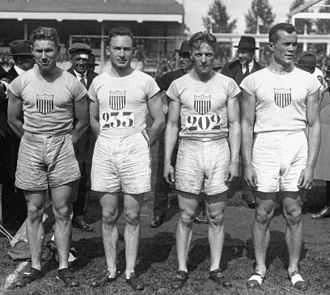Contents
| Men's 4 × 100 metres relay at the Games of the VII Olympiad | |
|---|---|
 The U.S. team, left-right:Paddock, Scholz, Murchison and Kirskey | |
| Venue | Olympisch Stadion |
| Dates | August 21–22, 1920 |
| Competitors | 52 from 13 nations |
| Medalists | |

| Athletics at the 1920 Summer Olympics | |
|---|---|
| | |
| Track events | |
| 100 m | men |
| 200 m | men |
| 400 m | men |
| 800 m | men |
| 1500 m | men |
| 5000 m | men |
| 10,000 m | men |
| 110 m hurdles | men |
| 400 m hurdles | men |
| 3000 m steeplechase | men |
| 4 × 100 m relay | men |
| 4 × 400 m relay | men |
| 3000 m team race | men |
| 3 km walk | men |
| 10 km walk | men |
| Road events | |
| Marathon | men |
| Field events | |
| Long jump | men |
| Triple jump | men |
| High jump | men |
| Pole vault | men |
| Shot put | men |
| Discus throw | men |
| Hammer throw | men |
| Javelin throw | men |
| 56 lb weight throw | men |
| Combined events | |
| Pentathlon | men |
| Decathlon | men |
| Cross-country events | |
| Individual | men |
| Team | men |
The men's 4 × 100 metres relay event was part of the track and field athletics programme at the 1920 Summer Olympics. It was the second appearance of this event. The competition was held on Saturday, August 21, 1920, and on Sunday, August 22, 1920. Fifty-two runners from 13 nations competed. [1]